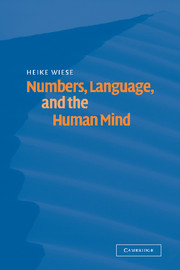Book contents
- Frontmatter
- Contents
- Acknowledgments
- Introduction
- 1 Numbers and objects
- 2 What does it mean to be a number?
- 3 Can words be numbers?
- 4 The language legacy
- 5 Children's route to number: from iconic representations to numerical thinking
- 6 The organisation of our cognitive number domain
- 7 Non-verbal number systems
- 8 Numbers in language: the grammatical integration of numerical tools
- Appendix 1 Number assignments
- Appendix 2 The philosophical background
- Appendix 3 Numerical tools: possible sets N
- Appendix 4 Conceptualisation of number assignments
- Appendix 5 Semantic representations for number word constructions
- References
- Index
4 - The language legacy
Published online by Cambridge University Press: 22 September 2009
- Frontmatter
- Contents
- Acknowledgments
- Introduction
- 1 Numbers and objects
- 2 What does it mean to be a number?
- 3 Can words be numbers?
- 4 The language legacy
- 5 Children's route to number: from iconic representations to numerical thinking
- 6 The organisation of our cognitive number domain
- 7 Non-verbal number systems
- 8 Numbers in language: the grammatical integration of numerical tools
- Appendix 1 Number assignments
- Appendix 2 The philosophical background
- Appendix 3 Numerical tools: possible sets N
- Appendix 4 Conceptualisation of number assignments
- Appendix 5 Semantic representations for number word constructions
- References
- Index
Summary
In this chapter, I am going to show that our account of numbers and counting words provides the grounds for a new perspective on the relationship between language and the emergence of numerical thinking in the history of our species. In particular I am going to show that the contribution of language does not end with giving us counting sequences as numerical tools. I will argue that language not only provides us with access to a number sequence, but that it is the human language faculty that enabled us to develop a fully-fledged, systematic number concept in the first place.
Crucially, such a concept enables us to employ numbers – or rather, ‘numerical tools’ – in a pattern of dependent linking: we can use them to identify empirical properties (like cardinality, rank, or identity) because of the relations they have with other numbers, that is, because of their position within a numerical system and not because they have these properties as individuals in their own standing. In short: it is the system that makes numbers. In the present chapter I am going to show that it is our linguistic capacity that enables us to grasp numbers the way we do: language as a mental faculty laid the grounds for the emergence of a systematic concept of number, a concept of number that builds on a pattern of dependent linking and covers the different numerical relational structures we use in number assignments and mathematical reasoning.
- Type
- Chapter
- Information
- Numbers, Language, and the Human Mind , pp. 94 - 150Publisher: Cambridge University PressPrint publication year: 2003



